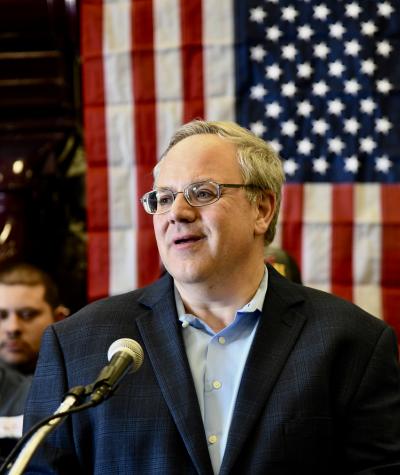The oil and gas industry has friends in high places at the Department of the Interior, and they know it.
A news report by Reveal/Politico showed that the oil and gas executives who make up an influential oil industry lobbying group called the Independent Petroleum Association of America (IPAA) were recorded bragging about the “direct access” they have to then-Deputy Secretary David Bernhardt – the same person who used to lobby on their behalf. The group’s political director bragged about knowing Bernhardt well, and said that he was going to “move the pieces” at Interior in their favor.
Bernhardt, the man who was all ears for the oil lobby’s opinions about “issues ranging from federal land access to endangered species,” is now poised to be Interior Secretary. At his Senate confirmation hearing in front of the Committee on Energy and Natural Resources on Thursday, Senators are expected to ask him pointed questions about his many potential conflicts of interests and cozy ties to special interest groups.
Some of those questions might pertain to the IPAA. Bernhardt is supposed to recuse from directly working with his former client to advance their interests at Interior – yet recordings show IPAA officials boasting of precisely the sort of “privileged access” that the ethics pledge Bernhardt signed is designed to prevent.
Bernhardt’s ethics issues don’t end there.
For years, Bernhardt lobbied for the big oil, gas and agricultural interests that he now regulates at Interior. In his role atop an agency with tremendous power over how federal lands are used for energy development, it has been hard to determine whether he actually stopped lobbying for special interests and started working for the American people.
The biggest names in the oil and gas lobby pay millions for privileged access to policymakers between lobbying spending and campaign contributions. The potential for one of those lobbyists who they used to pay (David Bernhardt) to be installed as Interior Secretary is a huge win for his former lobbying clients.
There is already evidence that Bernhardt is exploiting his power to advance the interests of the lobbying groups that used to pay his salary, potentially at the expense of the public. After lobbying for years for the powerful Westlands Water District, he entered government and sought to undermine endangered species protections that had hindered his former clients’ access to water, in violation of ethics rules. During the government shutdown, dozens of drilling permits were awarded to companies whose executives sit on the boards of Bernhardt’s former clients, like the IPAA. Shortly after Bernhardt took office, in December 2017, Interior’s Bureau of Land Management finalized a repeal of a rule that regulated fracking on publicly owned lands, a result IPAA had sought in litigation against the agency. And Bernhardt has dozens of other former lobbying clients who could similarly benefit from actions at the agency he seeks to lead.
David Bernhardt is only one piece of the troubling ethics puzzle at Interior, though. Throughout Interior, former lobbyists and industry big-wigs have moved through the revolving door.
Former Counselor to the Secretary for Energy Policy Vincent DeVito represented energy clients like Eversource Energy before entering government. While at Interior, he met with Eversource to discuss one of their wind energy projects, for which Eversource sought to reduce regulatory burdens. Now DeVito works at an offshore oil company. Assistant Secretary for Insular and International Affairs Doug Domenech used to be the Director for the Fueling Freedom Project at the Texas Public Policy Foundation (TPPF). He then met privately with TPPF to discuss its ongoing litigation against his agency. Six months later, Interior settled the lawsuit with favorable terms for TPPF.
If Bernhardt’s commitment to an ethical culture at Interior is more than just lip service, he will have to reckon with the department’s rampant unethical conduct, including his own, as Secretary. Senators should demand that Bernhardt act as a model for ethical conduct at the agency by strictly adhering to both the letter and the spirit of ethics laws. Ethical leadership at Interior must include recusal from matters that present even an appearance of impropriety, and the enforcement of that same standard for all Interior employees.

